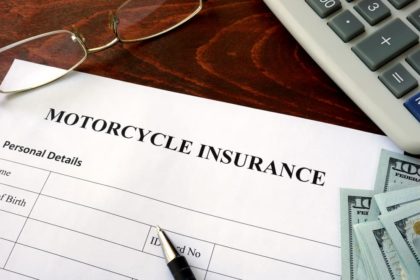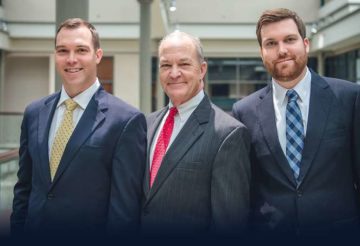Motorcyclists commonly suffer injuries in traffic accidents because of the open nature of their vehicles. Their lack of protection and small size leads to more injuries and more severe injuries than those in passenger vehicles when an accident occurs. Although bikers face more severe injuries after motorcycle accidents, they are also more likely to face insurance company bias when seeking compensation for their injuries.
Skilled motorcycle accident lawyers have experience handling insurance company biases against motorcyclists. If you suffered injuries in a motorcycle accident, it’s in your best interest to consult with an experienced lawyer immediately. A lawyer can advocate for you and ensure the insurance company involved is treating you fairly.
Until you have the chance to meet with an attorney, we provide some preliminary information about insurance company bias against bikers, recovering damages after a motorcycle accident you did not cause, and how a lawyer can help you through the legal process of seeking compensation.
Understanding Insurance Company Bias Against Motorcyclists

The reasons that insurance companies have a bias against bikers are far from legitimate. However, insurance providers use questionable tactics to avoid short-changing motorcyclists in personal injury claims. If you are a biker, there is no question you need a lawyer to fight for you. However, you need to know what you’re up against. Here are two of the main issues surrounding insurance company bias against motorcyclists.
Motorcycle Accident Injuries Are Expensive
The Insurance Information Institute estimates about 65 percent of bikers wear helmets while riding. More than 80,000 sustain injuries yearly, with about 5,000 suffering from fatal injuries. A strong correlation exists between not wearing a helmet, reckless driving, and the high cost of injuries. Unfortunately, insurance companies assume that all motorcyclists do not wear helmets and drive recklessly, which is not the case.
Yet, motorcycle accidents lead to more severe injuries, even for safe bikers who wear helmets. They do not have the same protection afforded to those in cars, trucks, and SUVs. Data from the Centers for Disease Control and Prevention (CDC) shows that the average biker racks up $15,321 in medical costs after suffering injuries in an accident. This totals more than $81 million yearly in medical costs for injured motorcyclists. If you add in losses related to the value of one’s life, the total is more than $10 million for each motorcyclist who suffers injuries.
Auto-, homeowners-, motorcycle-, or business insurance companies make money by collecting premiums from their policyholders. They profit by paying out less in settlements and court-awarded damages than what they bring in from premiums.
For example, if a large insurance company brings in $50 million in premiums yearly, it must pay much less in claims to cover its operational costs and make a profit. The way insurance companies make their money motivates them to pay as little as possible for all claims. Yet, bikers are an easy target because of their reputation.
The Genesis of a Bad Reputation
Insurance companies take advantage of society’s negative assumptions about those who ride motorcycles. Many people who haven’t been around motorcycles or bikers assume that motorcyclists are reckless drivers because of a long-time association with criminal activity and biker gangs. Movie and television portrayals of motorcycling and bikers foster that bad reputation. The bad reputation of motorcycling and bikers began more than 100 years ago.
In the early 1900s, motorcycle races were massive sporting events. Motorcycles raced on board tracks, called motordromes, and could go more than 100 miles per hour, making board track racing an exciting event.
However, public views about motorcycle racing drastically changed in 1912 when a motorcycle left a track and killed six spectators at a motordrome in Newark, New Jersey. Newspapers used the ‘skull and crossbones,’ the universal sign of danger, to report the accident without any headlines and started calling motordromes murderdromes. The negative reporting led to the collapse of board track racing, and motordromes were abandoned.
Motorcycles fell out of favor for several years, coinciding with both World Wars. The American Motorcycle Association (AMA) hosted a few motorcycle races, called the Gypsy Tours, but suspended them during World War II. Once the war ended, the AMA held a race on Independence Day of 1947 in Hollister, California.
The race welcomed 1,4000 motorcyclists from around the country to climb the hill and participate in street races. The bikers ended up drunk and fighting, ultimately leading to a riot, another historical moment contributing to the poor reputation of bikers as reckless riders who cause trouble.
Finally, the major and most recent event that curbed society’s views of bikers is the creation and existence of the motorcycle gang Hells Angels. The motorcycle club began in 1948 in California and consisted of many veterans longing for excitement, adventure, and the freedom of riding on the open road.
The club’s image went downhill, and they became known as barroom brawlers. Ultimately considered an outlaw motorcycle gang, many Hells Angels have been suspected of murder, extortion, drug trafficking, and other criminal activities, further tarnishing the reputation of motorcycling and motorcyclists.
The dangers of motorcycling, motorcycle gangs, and media coverage help maintain a negative image of bikers. Although some people remain unaffected by these stereotypes, others continuously reinforce and perpetuate them. Most bikers are law-abiding citizens who enjoy riding their motorcycles safely operate their machines on the nation’s roads and highways. Unfortunately, insurance companies—who may or may not believe negative stereotypes—use the bad reputation of motorcyclists to treat them unfairly in motorcycle accident injury claims.
Recovering Damages After a Motorcycle Crash
Bikers face many losses after suffering injuries in a motorcycle accident. They must pay for medical expenses and often lose income from time away from work. However, bikers also face major noneconomic dangers like pain and suffering. Combined economic and noneconomic losses, called damages, can overwhelm motorcycle accident victims financially and emotionally.
If you take action against the driver or other party responsible for your crash and injuries, you could receive money for your damages, including compensation for:
- Medical treatment costs include ambulance and emergency services, surgery, diagnostic testing, doctor visits, physical therapy, occupational therapy, prescription medication, and assistive devices
- Estimated future medical expenses when a motorcycle accident causes a permanent injury, requiring continuous treatment
- Property damage to your motorcycle and other personal property damaged in the motorcycle crash
- Lost wages from the weeks or months away from work for injuries and rehabilitation
- Loss of earning capacity when permanent motorcycle accident injuries prevent a return to work or the ability to seek future employment
- Physical pain and suffering
- Mental anguish
- Loss of consortium
- Reduced quality of life
- Scarring and disfigurement
When you meet with a lawyer who has experience handling insurance company biases against motorcyclists, they can advise you on the damages that apply to your case.
How Lawyers Help Bikers Fight Insurance Company Bias
If you have suffered motorcycle accident injuries and you feel an insurance company has treated you unfairly, or you want to avoid dealing with bias altogether, an experienced motorcycle accident lawyer can guide you through the insurance claims process and advocate for you with the insurance company.
Lawyers help their clients fight insurance company bias and get the compensation they deserve in several ways, including:
Knowledge of the Law
Personal injury lawyers have in-depth knowledge of the law, and most importantly, how to apply it to a case to ensure they get the best possible outcome for their clients. Fighting insurance company bias means lawyers must know more than filing deadlines and negotiating settlements. They need to know when insurance companies are acting in bad faith, so they can ensure their client is receiving fair treatment.
Insurance companies know that claimants without legal counsel do not have the same advantage, so they often play more games. Hiring a lawyer to represent you in your motorcycle accident claim shows the insurance company they need to take your injury claim seriously. Additionally, they are less likely to use questionable tactics or treat bikers unfairly when they know a motorcyclist has hired an attorney.
Proving a Claim
Prevailing in a motorcycle accident injury claim requires plaintiffs to prove negligence to the court. However, you must prove negligence to the insurance company prior to trial to have any chance of reaching a settlement agreement because proving your claim gives you leverage with the insurance company.
Legitimate motorcycle accident injury claims include proof of four main elements of negligence, including:
- Duty of care. The party who caused your motorcycle crash, called the defendant, has a duty of care towards you. Anyone who shares the road with a biker has a legal duty to operate their vehicles safely and follow the rules of the road.
- Breach of duty. The defendant breached their duty towards you. For example, another driver was speeding, driving distracted, driving drunk, or engaging in another type of negligent behavior.
- Harm. You must have suffered harm from the breach of duty, which refers to physical injuries and financial loss in motorcycle accidents, but might also include emotional injuries.
- Causation. There must be a link between the breach of duty and the injuries you suffered. Ultimately, you must prove the defendant’s breach of duty caused you harm.
It takes more than a few statements to prove your claim. You must support each argument with evidence, which is where your lawyer comes in.
Lawyers prove negligence by gathering relevant documents and other evidence such as:
- Medical bills
- Medical records
- Receipts related to property damage repairs or replacement
- Pay Stubs from work
- Photo or video evidence from the motorcycle accident scene
- Police report
- Statements from eyewitnesses and expert witnesses
Insurance companies go the distance to fight each claim they receive, even when plaintiffs have a strong claim with mounds of evidence against their policyholder. A lawyer knows how to present the evidence in a convincing way that forces an insurance provider to remove their bias and believe you suffered because of their policyholder.
Relying on Facts
Personal injury cases are often emotionally charged claims. Victims of negligence are suffering and they deserve to receive compensation for their injuries. Insurance companies try to avoid financial liability and fight even harder when a motorcyclist is injured. Those reviewing the claim often let their bias towards bikers creep into their decisions, resulting in unfair outcomes for bikers who suffered injuries because of another party’s negligence.
Experienced lawyers know how to remove emotions and bias from a case and only rely on facts. When you hire a motorcycle accident lawyer, you can rest assured they will force the insurance company to look at the relevant facts of the case. They present evidence about how the accident happened, not how the insurance adjuster assumed things happened based on their bias against motorcyclists.
Taking Legal Action After a Motorcycle Crash

Immediately after an accident, you need to inform your motorcycle insurance provider of your accident. They will cover certain aspects of your losses in the interim. However, you want the other side’s insurance company to pay for all or the majority of the damages you’ve incurred from the motorcycle accident and your injuries.
Follow these tips to help the legal process go more smoothly:
- Contact a motorcycle accident lawyer immediately so they can begin working on your case.
- Report the accident to your insurance company, but do not admit blame or discuss anything you think you might have done wrong.
- Continue to seek medical treatment after your initial emergency room visit and follow the doctor’s orders.
- Keep all proof of economic loss, including medical bills, receipts, pay stubs, and other relevant paperwork.
- Begin a daily journal of the way your injuries impact your life physically, emotionally, and financially.
- Don’t discuss the details of your accident on social media or with friends or family.
The above tips help protect the value of your claim and provide the evidence your personal injury lawyer needs to fight against bias you might experience from the insurance company involved in your motorcycle accident.


